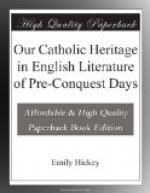Lord of Heaven’s realm, smote with holy hand
These heroes strong as pines, that people proud....
The yawning sea was mad,
Up it drew, down swirled; dread stood about them,
Forth welled the sea-wounds. On those war-troops fell,
As from the heaven high, that handiwork of God.
Thus swept He down the sea-wall, foamy-billowed,
The sea that never shelters, struck by His ancient sword,
Till, by its dint[B] of death, slept the doughty ones;
An army of sinners, fast surrounded there,
The sea-pale, sodden warriors their souls up-yielded
Then the dark upsweltering, of haughty waves the greatest,
Over them spread; all the host sank deep.
And thus were drowned the doughtiest of Egypt,
Pharaoh with his folk. That foe to God,
Full soon he saw, yea, e’en as he sank,
That mightier than he was the Master of the waters,
With His death-grip, determined to end the battle,
Angered and awful.
[Footnote B: blow.]
How fine a conception it is. Let us notice how far had been travelled from the old pagan “Fate goeth even as it will” to “the Lord of Fate.” How great is the thought of the vision of God’s might, the power of the Master of the waves, brought before the eyes of Pharaoh before he sinks in the death-grip that will not let him go!
CHAPTER III
Allegory. Principle of comparison important in life, language, literature. Early use of symbolism; suggested reasons for this. Poem of the Phoenix. Allegorical interpretation of the story. Celtic influence on English poetry. Gifts of colour, fervour, glow. Various gifts of various nations enriching one another.
In these papers we are not going through anything like a course of older English literature. We are looking at some of the work which our early writers have left, from the point of view of its being our Catholic Heritage, and we want to pay special attention to special works, not to go through a long list of names. It is hoped that the bringing forward of what is so good and strong in interest may be found really helpful by those who have little or no time to go to the originals. That it may be so is alike the desire of writer and publisher.
To-day we are going to consider a poem of a different kind from what we have had before, an old poem called “The Phoenix.”
Literature is full of allusions to the fable of the phoenix; it is one of those stories which have caught hold of people and fired their imagination; and the reason is, we may well suppose, because it has suggested so many comparisons, some of them great and beautiful and holy. There are some stories which lend themselves easily to an allegorical interpretation; stories quite true, and yet suggesting things beyond their own actual




